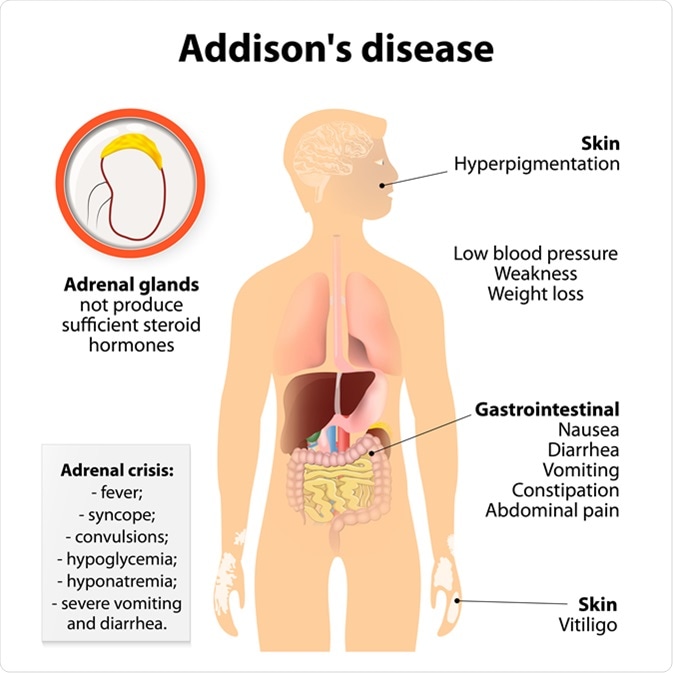Addison’s disease, which is otherwise referred to as an adrenal insufficiency, is a rare disorder that occurs when the adrenal glands are not producing enough of certain important hormones. This condition affects 1 in every 100,000 in the United States, with an overall global prevalence affecting between 40 and 60 million people(1).
While individuals of any age can be affected by Addison, the average diagnosis age is typically between 30 to 50 years. Both men and women are equally affected by Addison’s disease; however, this disease is slightly more common in women than in men for unknown reasons. This disease was first described by an English physician named Dr. Thomas Addison in 1855, to which it gets its namesake.

Addison's disease or chronic adrenal insufficiency signs and symptoms. Image Credit: Designua / Shutterstock
What are the Adrenal Glands?
The adrenal glands, which are also referred to as suprarenal (supra = above; renal = kidney) glands, are small pyramid-shaped glands that lie on top of the kidneys. The adrenal glands mainly produce cortisol, aldosterone and adrenaline, which are important hormones that play arole in regulating metabolism, the immune system, blood pressure, our ability to respond to stress and several other important functions(2).
The adrenal has two main areas, of which include:
- Outer Cortex: produces steroid hormones (cortisol and aldosterone)
- Inner Medulla: produces adrenaline
Causes of Addison’s Disease
One of the leading causes of Addison’s disease is tuberculosis; however, in developed countries, this disease often occurs as a result an autoimmune reaction. This autoimmune reaction causes the immune system to attack the adrenal glands.
Other causes of Addison’s disease can include fungal or viral infections, such as histoplasmosis and cytomegalovirus, respectively. In addition, various noninfectious causes can include cancer, congenital adrenal hyperplasia, bilateral adrenalectomy and the use of drugs such as ketoconazole and mitotane3.
Pathogenesis of Addison’s Disease
As a result of one or more of the aforementioned causes, a significant amount of damage or complete destruction of the adrenal cortex occurs. Unfortunately, patients do not experience the symptoms of this disease until approximately 90% of this area of the adrenal glands has been damaged. The destruction of the adrenal cortex causes for these glands to become unable to produce important hormones, namely cortisol and aldosterone(3).
Cortisol, which is also referred to as the stress hormone, affects how the body responds to stress. Some of the major functions of cortisol include maintaining blood pressure and cardiovascular function, regulating water quantities within the body, controlling blood sugar levels and assisting in our immune system’s ability to fight disease3. On the other hand, aldosterone primarily plays a role in regulating the balance of sodium and potassium ions within the body, maintaining water levels which thereby affects blood pressure and volume levels.
Symptoms
The symptoms of Addison’s disease are typically slow to develop and can vary from each individual. Furthermore, since many of these symptoms are nonspecific, misdiagnosis of Addison’s disease is also not uncommon.
- Fatigue
- Gastrointestinal symptoms
- Hyperpigmentation
- Commonly around scars
- Skin creases
- Mucous membranes
- Vitiligo (less common)
- Dehydration
- Dizziness
- Behavior changes
- Mood changes
- Low blood pressure
- Irritability
- Depression
- Poor concentration
- Craving for salty foods
- Low blood sugar levels
- Symptoms unique to women:
- Irregular menstrual cycles
- Body hair loss
- Decreased sexual drive3
Diagnosis
Following clinical evaluation, a diagnosis of Addison’s disease is commonly made by using the adrenocorticohormone (ACTH) stimulation test, which is a specialized test that measures the amount of cortisol present in the blood and/or urine after a dose of a synthetic stimulating hormone ACTH is administered to the patient. Since the ACTH stimulates the production of cortisol in the body, normal test results should show cortisol secretion. However, results that are indicative of Addison’s disease will involve the test failing to cause cortisol secretion.
Treatment
Addison’s disease is treated with medications that serve to replace the hormones that the body cannot produce. These drugs include hydrocortisone, which is used to replace cortisol, and mineralocorticoid, which is used to replace aldosterone. Additionally, patients with Addison’s disease can also take doses of cortisol when experiencing an acute illness or injury.
When diagnosed and treated properly, patients with Addison’s disease can lead a normal life. However, it left untreated, cortisol levels can become dangerously low, which can ultimately lead to adrenal crisis, which is a severe fall in blood sugar that leads to a cascade of other life-threatening complications.
Further Reading
Last Updated: Nov 26, 2018